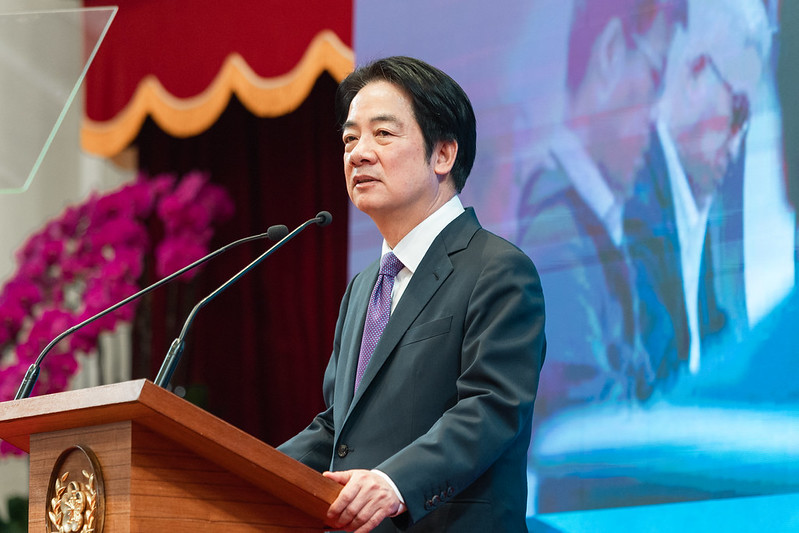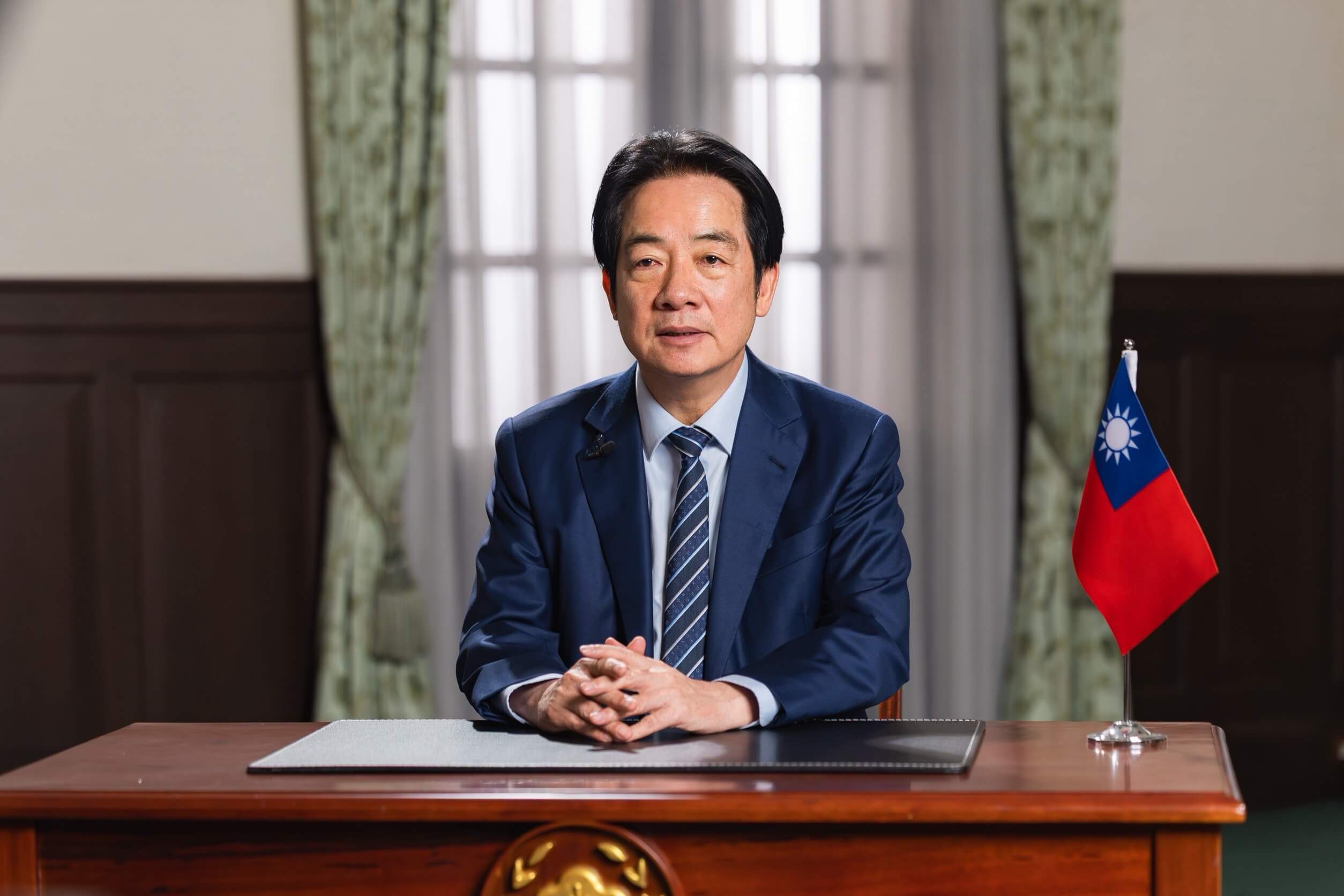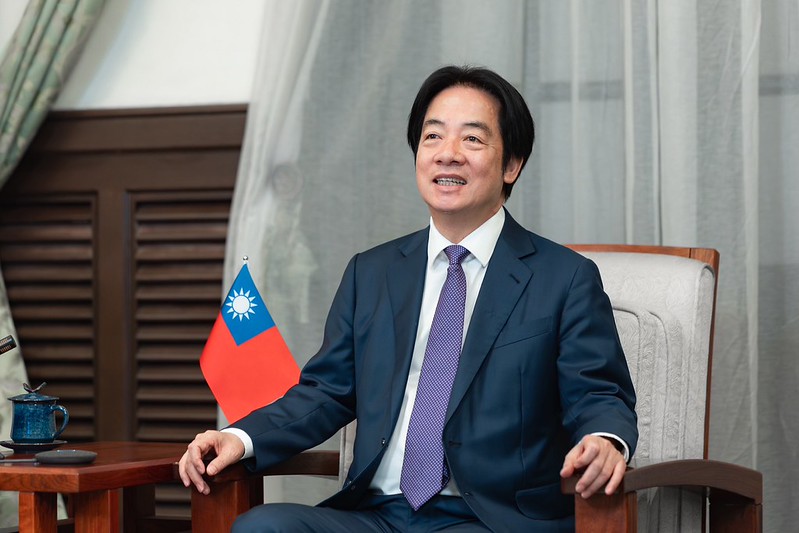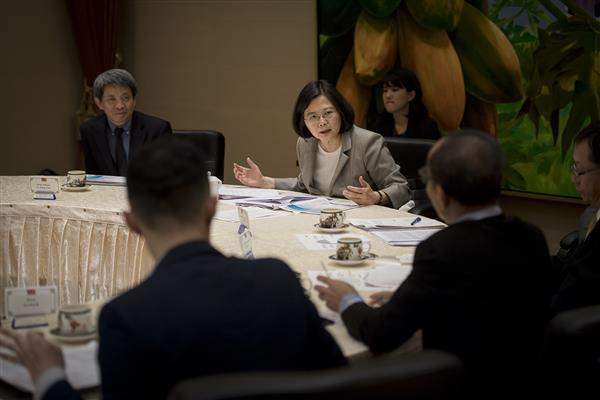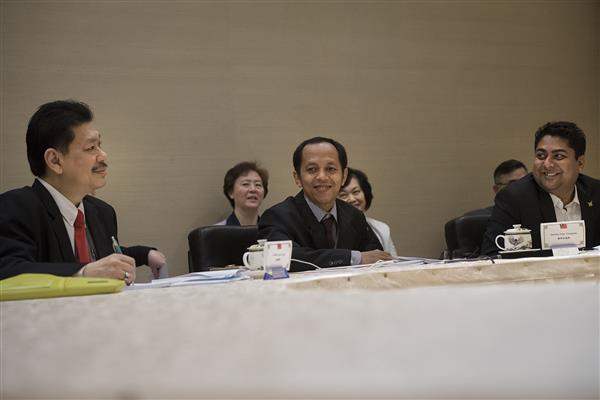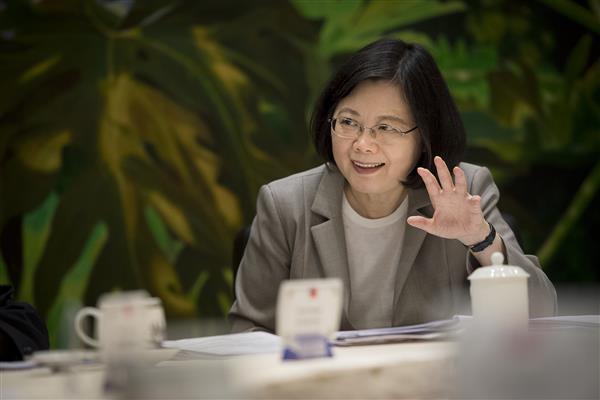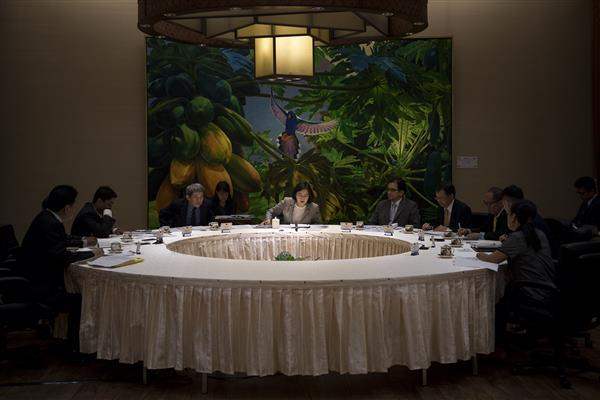News & activities
 News releases
News releases
On the morning of May 5, President Tsai Ing-wen had a joint interview by The Hindu from India, Kompas from Indonesia, The Sun from Malaysia, The Philippine Daily Inquirer from the Philippines, The Straits Times from Singapore, and The Nation from Thailand. In the interview, the president elaborated the thinking and objectives of Taiwan's New Southbound Policy which is based on economic complementarity and mutual benefits. She also expressed hope that we would capitalize on our advantages to strengthen cooperation with the countries of the ASEAN and South Asia, thereby establishing mutually beneficial relations, and working together to promote the welfare of the people in the region.
The following is the president's opening statement:
Good morning everybody.
I am very pleased to have this opportunity to talk about our New Southbound Policy, here today with a group of such distinguished journalists from across Southeast Asia and India.
Fundamentally, the New Southbound Policy is about how Taiwan can play a proactive role in a community of so many close neighbors. In contrast to some major countries that have geopolitical considerations in the region, the New Southbound Policy's aims are simple. It is about economics and trade. We want to build economically, mutually beneficial relationships that improve the lives of the people within this community.
This is the key message we want to convey to everybody here today. Many people in Taiwan are highly interested in New Southbound countries, including myself. Being the major policy initiator, I have a great interest in Southeast Asia, and India as well. As a trade negotiator in the past, I have had the opportunity to visit many New Southbound Policy countries, including the six represented here today. I have also been fortunate to have returned to many of these countries over the past few years. To me and many Taiwanese people, these countries are vibrant and thriving. Many also hold even greater potential because of their young populations.
So, for example—we have a journalist from India here—if I may use India as an example. India left a very deep impression on me when I visited in 2012. When I lost the 2012 presidential election I thought it might be a good idea to visit a country that I'd always wanted to go to. So I was there, and I took a 16-hour train ride from Delhi to Mumbai, which was quite an experience for me. I remember talking about the latest literature with the owner of a small bookstore in a train station. The way he displayed the newspapers and books, and the kind of books he selected—that was actually quite impressive. I also experienced unique Indian cuisine. Well, when I was in London I learned how to appreciate curry, but apparently India has much more than curry. And at every meeting and think tank visit in India, I spoke with brilliant people who were extremely thoughtful. I met young people inquisitive about the future. And of course, not mentioning the Indian film industry—Bollywood—would be an incomplete story about India. I noticed there's a film called "3 idiots," which is hugely popular here in Taiwan. It's definitely a favorite of many people here in Taiwan, especially young people, and highly relatable in today's culture.
In 2013, I visited Indonesia. In Jakarta, which is a city of 10 million people and a center for ASEAN, I met young people who were confident and ambitious. I mean, many of them have their mobile phones with them and they get themselves connected with the rest of the world through this phone; it's very impressive. All across the city, I saw people working to develop the country. At the time, I visited Kompas, the media group of one of our journalists here today. Their reporting showcased Indonesia's diversity and richness. Even in Taiwan, young Indonesians working here are known for their diligence and hard work, and they are very much appreciated here. They play an invaluable role in Taiwan's economy today.
Furthermore, throughout Malaysia, the Philippines, Singapore, and Thailand, each country has their storied history and rich culture. As vibrant countries with a high level of globalization, they are natural friends and partners of Taiwan.
So having said all that, I would like to welcome all of you to Taiwan. I value this opportunity to extend my greetings to the people in your respective countries. In response to the many questions you have submitted beforehand, I want to start by giving a general overview of the New Southbound Policy. This is supplemented by the information package we have prepared for you.
As I mentioned, the New Southbound Policy isn't about making a political statement in the region, but it is about how we can build more mutually beneficial relationships with the international community, and the community here in Asia. It's taking another look at how Taiwan can play a more proactive role in a community of so many close neighbors.
Let me repeat: It is not about geopolitics. It is about economics and trade.
So our overall objective is to strengthen Taiwan's cooperation with each country in terms of resources, talent, and markets. We hope to build more long-term and strategic relationships on a mutually beneficial basis.
So, in terms of the New Southbound Policy, what are the specifics?
The first area is developing and sharing talent and resources. Human resources, including skilled laborers, engineers, and R&D personnel are essential to many rapidly developing New Southbound countries. Taiwan can help in this area. We have many high-quality universities and colleges, as well as training centers, which can provide industry-specific human resources training. Already, there is ongoing cooperation with countries including India, Indonesia, and Malaysia. It's mutually beneficial, and we hope to expand this in the future.
More recently, we are promoting a plan to better develop industrial talent. The government is working to bring in both schools and the private sector to expand cooperation in a number of fields. The objective of such cooperation is to provide better skills training in the areas that benefit both New Southbound countries and Taiwanese-owned businesses operating both here and overseas, especially in Southeast Asia—and hopefully in the future, in India, as well. I can give you an example: About 1,200 Indian students are currently studying in Taiwan. We plan on further expanding the Taiwan Scholarship and Taiwan Fellowship awards for talented Indian students to study in Taiwan.
We also encourage our companies here to sponsor such fellowships or scholarships so that we can actually provide a large amount of help to students from India, and other places as well. And it's good for our companies when they sponsor young people from India and other places to come here and study in university or college or even receive training in the training centers. They will pay for their living costs and tuition, and also provide practical training opportunities for these students. After graduation, they may want to spend some time with these companies here, before they return to their home countries, and then when they return, they become good bridges for the Taiwan companies who move to India, and to other places as well. I thought this is a good thing to do. And our industry likes the idea. I was informed by our Ministry of Education that the number of companies and students participating in this program is rapidly increasing. We're expecting about 5,000 students from different New Southbound countries. This summer, we'll be getting 5,000 students of that kind—with private sector sponsorship. So that's the first area, the human resources part of it.
The second area is industrial cooperation and the development of domestic markets. Most New Southbound countries have a large and rapidly growing domestic market. While this provides great potential for the development of many new industries, it requires both skill and experience. This is where Taiwan can play an important role. We have an abundance of experience in industrial development. We can work together to develop new opportunities, particularly for domestic markets. When I was in some of the New Southbound countries, I sensed that there is so much market potential to explore.
I can give you an example: When I was in India, I found that it's difficult to get seafood in inland states, but I thought that people living inland are entitled to have seafood as one of their food items, and so that requires logistics and food processing—or even fish-farming techniques—in inland India, so I guess we have plenty of experience of that. And of course, we have companies interested in making investments in that regard, so this is an example of this market potential to be explored. Since you have so many people out there, such a big population, there are plenty of ways of improving the quality of life there. This is the market potential that I was talking about and I'm sure we have a lot to offer.
Another example I want to use is Indonesia, this inter-island transportation by boats and all sorts of vessels. We have a pretty decent shipbuilding industry here. We're already talking about joint ventures for building transportation vessels for your inter-island traffic. So this is another area I see the market potential for Indonesia and Taiwan as well.
So strengthening our presence in these big domestic markets will strengthen our competitiveness and help us enter other regional markets as well. To me, it's perfectly mutually beneficial for us to make joint efforts.
Now, the third area is in terms of our manufacturing capabilities. Taiwan has one of the best manufacturing industries in the world. People all over the world come to Taiwan to learn more about our industries, particularly our ICT and technology sectors. Taiwan has not only sufficient capabilities to fulfill the demand of different markets within the region, our experiences can also help build manufacturing industries in other countries as well. For example, Taiwan has an advanced shipbuilding industry, as I said. Working together, we can help address one of Indonesia's challenges, which is water-based, inter-island transportation to its 10,000 islands, while creating high-paying jobs at the same time.
So agriculture, industrial development are things that we can help with, and have the experiences and investors to offer.
The fourth area, which I think is very important, and perhaps is the most important area where we can have a cooperative relationship, is small and medium-sized enterprises. Taiwan is known for our resilient, energetic, and competitive SMEs, and the SME culture as a whole is uniquely and very distinctively Taiwanese. SMEs not only create a wealth of jobs, they are also key to growing local economies. They are one of the most effective methods of tackling income inequality. We are willing to share our experiences here with New Southbound countries. This can, for example, help strengthen Prime Minister Modi's "Make in India" policy.
Finally, based on what I have said, and to make our efforts more focused, we have developed five new flagship projects. This includes the joint development of industrial talent, medical cooperation and industrial supply chains, innovation-based industries, and regional agriculture. The last thing is policy forums and youth exchange platforms. I thought it would be good for the young generation to have a forum to make exchanges.
The flagship projects take into account Taiwan's soft power, particularly in healthcare, education, human resource development, technological innovation, agriculture, and disaster preparedness. They seek to share Taiwan's experience in areas that fulfill the needs of New Southbound countries. This will contribute to both the development and wellbeing of people across the region, as well as further our sense of community.
We also hope to invite more people from New Southbound countries to visit Taiwan. Over the past year—in 2016 and early on this year—we have introduced visa-free programs for many countries and assisted Taiwan business owners in acquiring Halal certification. This shows that Taiwan is welcoming to a diverse mix of tourists, such as those from Muslim communities. Already, we are making progress. Over the past year, the growth of inbound tourists from New Southbound countries has outpaced the increase in the overall number of tourists arriving in Taiwan.
I also want to use this opportunity to address some claims made by critics of this policy. There are people who say Taiwan has not allocated a large enough budget for the New Southbound Policy. There are others who say that China's Belt and Road Initiative has reduced Taiwan's space in the region and is an obstacle for the policy.
I wish to emphasize that the New Southbound Policy and China's Belt and Road Initiative are two completely different models. Taiwan enjoys immense soft power capabilities from our private enterprises, as well as our ongoing work in healthcare, education, human resource development, technological innovation, agriculture, and disaster preparedness. This cannot be replaced or blocked by either money or politics.
Now we have a Singaporean friend here so I want to use Singapore as an example in this case. Many of Singapore's neighbors are large countries. But Singapore is able to develop its own advantages based not on geography or scale, but on vision and ambition from its political leaders. If Singapore saw its size as a limitation, it would not be in the position it is in today.
So, what I have been saying from the start, is that the New Southbound Policy is not about making a political statement in the region. It is about fostering a mutually beneficial relationship with the international community. It isn't about competing with China, but about emphasizing Taiwan's own advantages and promoting mutually beneficial development as a member of the regional community.

